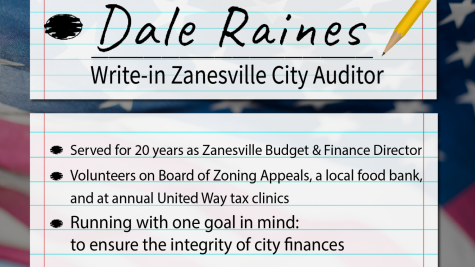Needle exchange program on hold until all ORC compliance requirements are met
October 30, 2019
Tuesday evening, the Zanesville-Muskingum County Health Department hosted an informational community forum to further educate the community on the Safe Point Program.
- Watch the live stream of the meeting here.
At that meeting, Assistant Prosecuting Attorney Mark Zanghi took to the podium to inform the representatives from the department, as well as the members of the Board of Health that the Safe Point program is not in compliance with the Ohio Revised Code.
“It had been in operation for two years before our office found out about it,” Zanghi said following the meeting. “And then we advised the health department that, once we found out and reviewed the statute which enabled the establishment of a program, that they weren’t complying with it and we advised them to seize the program until they became compliant.”
Local boards of health were authorized in 2015 to begin implementing programs like Safe Point that aim to prevent blood-borne infectious diseases by providing clean needles to those who bring in dirty needles at the board’s own cost.
The ORC section that presents the guidelines for the program (section 3707.57) states that the Board of Health must consult law enforcement, prosecutors, representatives of community addiction services providers, people recovering from substance abuse, relevant non-profit organizations, residents of the health district and the mental health services and recovery board, as well as authorities in the city where the proposed program is going to be established.
“It was our contention that they had not followed through with all of those things,” Zanghi said. “… So until those things are accomplished, they can’t operate the program.”
Zanesville-Muskingum County Health Department Director Corey Hamilton said many of the requirements have been met over the past couple of years, although the department did unintentionally overlook a couple required meetings.
In 2016 and 2017, members of the health department spent time at regularly scheduled meetings with different government entities and organizations in the community informing them about the prospective Safe Point Program that ultimately went into effect in September 2017.
“Pretty consistently, we didn’t hear a lot of push back from the people we were talking to,” Hamilton said.
Within the same week in February 2016, Hamilton said the department’s director of nursing met with Muskingum County Sheriff Matt Lutz and Captain Jeff LeCocq, as well as Zanesville Police Chief, at the time, Ken Miller.
“Both of those meetings resulted in a pretty common stance on the program (which was) we’re not really sure about this, it seems kind of counterintuitive to what we’re trying to do for this drug epidemic in our community, but we see what you’re saying and we see that you’ve got the evidence behind you and so we won’t stand in your way,” Hamilton said of the meetings with law enforcement.
While the requirement to meet with law enforcement was met, Zanghi said there were requirements, including meeting with the prosecutor’s office, that were not met before starting the program.
“Once they are in compliance and they go through the consultation process, the law allows them, the statute allows them to have this program over the objections,” Zanghi said. “Let’s say that law enforcement objects to this. If our office objects to it, that’s OK, we can object to it, but the health department can go ahead and still have the program. But they have to have the consultation first, what they did was put the cart before the horse.”
Hamilton clarified that the ORC does not require the health department receive any approval from the listed entities or organizations listed in the ORC, rather it only requires that those groups be informed about the purposes and practices of the Safe Point Program.
Due to the lack of compliance, the Safe Point Program was suspended at the end of September and an attempt to reopen the program was made following a presentation from the health department to Zanesville City Council and Law Director Dave Tarbert.
Hamilton said she again received a letter from the Muskingum County Prosecutor’s Office stating that the department was required to inform the community living in the health department district and meet with the prosecutor.
Tuesday evening, the community forum checked off the requirement to inform those living in the health department district. Many officials in the community, as well as organization leaders and community members, attended the forum in an attempt to understand the program, ask questions and voice their stance on the needle exchange.
“I think the most compelling speaker last night was the young lady who had said that she felt like the needle exchange program has really saved her and had helped her finally break free from her addiction,” Hamilton said.
While the meeting completed one outstanding requirement, the health department is still required to meet with the prosecutor before the program can gain compliance with the law.
“If they follow these rules, then the ORC allows them give out the needles,” Assistant Prosecuting Attorney John Litle said. “If they don’t follow these rules, then they fall underneath the furnishing needles statute, which is a felony of the fourth degree. If you give a needle to someone who is not a lawful person to have a hypodermic, it’s a felony of the fourth degree no matter who you are.”
Representatives from the prosecutor’s office and the health department are in disagreement as to whether efforts have been made to schedule a meeting, but both entities said they looked forward to meeting with one another.
“Mike Haddox, as county prosecutor, looks forward to meeting with the health department as soon as possible to consult with them on this matter,” Zanghi said.
Hamilton echoed Zanghi’s remark to state that the health department is looking forward to the meeting in order to complete the final steps to gain compliance. Once that step is completed and the needle exchange program can be re-presented to the local board of health, a decision to reopen or decline the reopening can be made.
“I think the Board of Health seriously wants to understand the prosecutor’s concerns about this program because I think they’ve made that very loud and clear that they have very serious concerns about this program and whether or not it’s a good program for our community,” Hamilton said. “And we certainly want to sit down with them and have that conversation and try to understand what their concerns are and try to determine if we can come to common ground about moving forward one way or another.”
Read more about the Safe Point Program here: Needle exchange program reopens in effort to prevent blood-borne infectious diseases



















Tim • Oct 31, 2019 at 7:57 pm
I understand you are for more government handouts. most of these folks are like stray dogs. The more you give them the more they take and keep coming back. The same reason the homeless population is exploding around here, free handouts! They need to stop those first or nothing will be solved. For the folks that want help, it’s out there. Giving them clean needles to support their habit is far different than getting help.
Bob • Oct 31, 2019 at 9:41 am
It is refreshing to see a local organization treat individuals with substance abuse disorders with respect and dignity and address drug abuse disorders as a public health issue instead of a criminal issue. Harm reduction programing is an excellent way to reduce risks for the individual and public. Prohibition does not work, the government can not arrest it’s way out of a wide spread public health issue. Decriminalize and/or legalize and use the tax revenue to provide public services that really provide treatment and save lives. America currently has the largest prison population in the world, most are nonviolent drug offenders that have been charged with “victimless crimes” between consenting adults. Safe injection sites and drug potency testing kits could save even more lives if public officials would take their heads out of the blinding sands of prohibition from yesteryear and allow these treatment programs to operate.
Tim • Oct 30, 2019 at 9:01 pm
Really giving away free needles now?!?! Why not just give these bums free food? how about free cell phones? How about free places to live? How about A free check every month? How about free healthcare? Oh wait, they already this all this free stuff and I can go on and on, what is this world coming to. Time to clean things up quit giving free handouts, bottom line! Another waste of funds that won’t help anythjng!